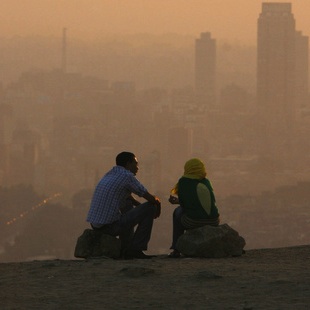By: Anum Khan
While not all are convinced that humans and the burning of fossil fuels is causing global warming, it is a no-brainer that increasing populations and productivity is leading to a deteriorating environment. Though, in the last few decades, society has been more concerned with saving the environment with innovative ways. As many governments overlook caring about the environment, individuals and private organizations have taken the action of educating society about sustainable practices and implementing novel projects, such as those led by the Zabaleen, who are informal garbage collectors of Cairo, the American University in Cairo in Egypt and the Pakistan Sustainability Network. With collective efforts by concerned citizens, environmental concerns are now resulting in direct action and immediate results.
Egypt has always been a cultural leader of sorts in the Arab world, and has maintained an efficient recycling system for the past several decades. The Zabaleen are not only leaders in recycling in Egypt, but triumphs over many of the recycling programs in Europe and North America—mainly because the Zabaleen are able to recycle about 85% of all waste in Cairo. And Cairo, of 20 million people produces a lot of trash! There are about 50,000 to 70,000 garbage collectors, mostly Coptic Christian who live and work throughout Cairo. The Zabaleen were even profiled in a documentary called, Garbage Dreams: The Life of Cairo’s Zabaleen, telling the stories of three men who work as garbage collectors.
The Association for the Protection of the Environment works with the Zabaleen, and even helps women improve their economic situations. These women are learning how to turn trash into money, literally by recycling and creating products, such as paper crafts and artwork. Ezzat Naem Guindy is the founder of the Spirit of Youth Association for Environmental Service that serves the Zabaleen’s youth with literacy and skills programs. The Zabaleen continues to face challenges under the Muslim Brotherhood-led government where the Zabaleen are still not officially recognized by the state. In an interview with Ahram Online, Guindy stated, “The problem first began with the government’s decision to contract foreign companies to do our job, even though we know the garbage system better than anyone.” These foreign companies are only recycling up to 20% of the garbage collected, whereas the Zabaleen are able to recycle mostly all trash.
In a private school setting, Tina Jaskolski, Research Coordinator at the Desert Development Center (DDC) at AUC leads the Sustainable Campus Committee—consisting of students, staff and faculty interested in environmental sustainability efforts on campus. After being able to convince the administration that the university needs an office specifically devoted to green efforts, launched the Office of Sustainability in September 2010. Some direct results of these individuals are reducing energy consumption by 30% and treating waste water for irrigation purposes to save and recycle water. AUC is the first university in the Middle East and North Africa region to have calculated its carbon footprint, which is the first step in actively reducing waste. The university also invested in growing and selling its own fruits and vegetables by tending to a vegetable garden on-site as well as 575 acres off-campus.
As Egypt is tackling the issue of environmental sustainability through independent organization within the community, Pakistan also seeks to work via a grass-roots approach. Pakistan Sustainability Network, founded in 2009 has been pro-active in green efforts, especially when governments are usually not on top of reducing waste and recycling efforts. PSN created the Lahore Environmental Youth Council, which is a collective council of more than a dozen high schools in Lahore working on sustainability issues. Kurt Archer, one of the founding directors of PSN, states, “Our projects are run entirely by passionate youth volunteering to make a difference.”
These young activists have been able to make some headway, and even put forth proposals before civil government officials to protect green areas in Lahore—in which the “largest green patch in Lahore is along the canal.” Also, with a partnership with Uth Oye clothing company, PSN was able to work on a project to provide thirty solar lanterns that do not run on fossil fuels to villages in Sindh.
While they have their successes, there are many challenges that face PSN. Archer describes the obstacles of meager funding, mentorship and internal structuring—which are setbacks many newly initiated organizations face. Other barriers include a lack of women’s participation due to the meetings taking place after work hours and transportation difficulties. Archer says, “they cannot attend many of the events” due to “family pressures and perception.” To encourage participation of women who are interested in environmental issues, they hold meetings on weekends and have recruited women to work as bloggers and advertisers, which they can do from their homes.
While many new “green” initiatives are taking place at a macro level in the Middle East, grassroots efforts are also important within the process. Long-term solutions are only sustainable when government plans include private citizens’ involvement.






























http://ecosysblogs.wordpress.com/2013/03/30/reviving-the-symphony-of-conservation-in-our-society-and-culture/
Many people don’t usually think “green” when they talk about the Middle East. Very interesting to see these initiatives take off.